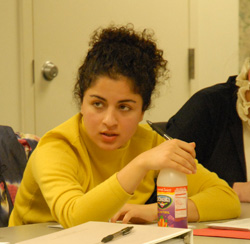In the midst of controversial discussions between the Georgetown University Student Association and the Student Activities Commission over the SAC chair selection process student clubs, which receive their funding from SAC, have so far found themselves left out of the decision-making process.
“Student organizations know best the problems they face, and they should be the ones making these decisions,” College Democrats president Adam Feiler (SFS `09) said. “And a lot of organizations haven’t even been asked what they think should be done.”
College Republicans chair Ellen Dargie (COL `10) said she feels the change in the SAC chair selection process seems like a potentially positive step if it increases SAC’s accountability. Some groups, however, feel that SAC has other problems in greater need of reform.“They meet together every week and discuss things like they’re some Roman consuls … asking the lone treasurer hostile, accusing questions,” Feiler said, at the same time noting that the Democrats have received most of the funding they have requested.
“There’s an atmosphere of SAC commissioners having power, and I think it’s very corrupting for some of them.”
SAC chair Sophia Behnia (COL `09), acknowledging that a SAC meeting could be intimidating, said that it was not intentional on the part of the commissioners.
“Of course it’s not supposed to be that way and we don’t want to scare anybody,” Behnia said. “But I can definitely understand how it could be [intimidating] if you come into a meeting with 13 commissioners.”
“We’ve had to be very select with what we’ve gone to SAC with,” Brigid Bower, (COL `11), the treasurer and vice president of Right to Life and treasurer of the Catholic Student Association, said. “Generally, we’ve avoided it.”
One current treasurer, who asked to remain anonymous when discussing SAC due to his continued need to receive funding from the commission, said the SAC commissioners’ emotional dispositions often bothered him.
“They’re very touchy, very quick to take personal offense and quick to accuse people of being disingenuous, liars and frauds, although they’ll never come out and say it directly,” the treasurer said. “And once they decide they don’t like you or don’t like your group, your treatment changes.”
According to Behnia, “that wouldn’t happen.” She said she is happy to hear any concerns groups might have about SAC. However, multiple treasurers explained that they were hesitant to call for increased transparency in SAC.
“Clubs are really in a Catch-22,” the anonymous treasurer said. “We don’t like the situation as it is and we want it to change, but … we’re afraid that if we make a public move to try and change the system, there will be retribution.”
GUSA is planning on hosting a club summit on SAC reform in January, where Senator Nick Troiano (COL `11) said he will distribute confidential surveys to groups so he can gather opinions and clubs will not have to worry about jeopardizing their funding.




